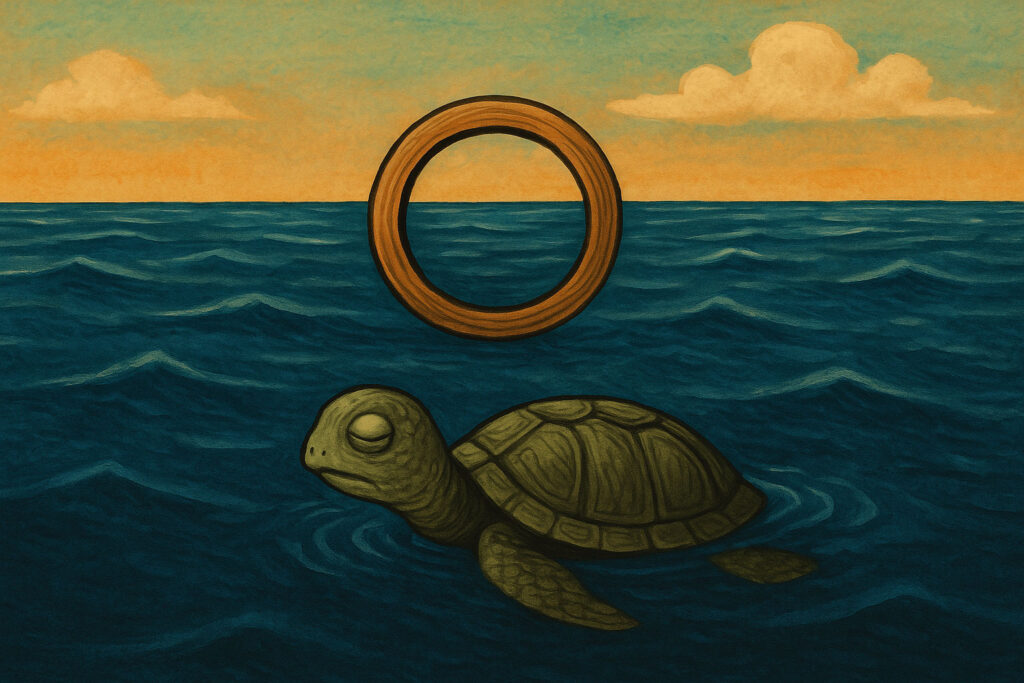
Breathing Your Way Back Home
A Buddhist parable of a blind turtle inspires reflection on life’s rarity, balancing samsara’s struggles with presence and spiritual homecoming.

I watch the Tour de France every summer. I love it. What those cyclists endure is not human. They are operating so far beyond normal human cardio limits it blows my mind. To win this race over weeks of racing and over 2000 miles of terrain, a victory can come down to the thinnest of margins.
Today, they did an analysis of one of the top rider’s helmets. The design for optimal aerodynamics was based on the rider’s position in the saddle at full flight. Head down. The holes in the helmet aligned for a “head down” riding position for efficiency. This particular rider was a bike length faster over 200m when in a proper head down position. Only one bike length. If his head raised up, he was less aerodynamic and rode slower. A tiny leak. But they found it and fixed it with a minor modification to the helmet design.
I started thinking about these kinds of “leaks” in other systems in life, from those in business, to others in the personal realm. What can we do to identify these leaks and fix them?
It turns out that the way that we farm here is optimal for finding these inefficiencies, or leaks. Our cultivation facility is a closed-loop system, so the opportunity for finding and fixing issues is built into the production process. A closed-loop system is “a system where the output is continuously monitored and used to adjust the input, creating a self-regulating and adaptive process.” We gather data, make adjustments, tweak and tune our closed-loop system over and over and over.
For example, one of our flower rooms on the farm has been underperforming for quite some time now. With essentially identical inputs, environment and genetics why would the plants in this room perform so much more more poorly than in our other cultivation rooms? Turns out we had a setting on the primary room controller that someone had programmed incorrectly. A leak.
There is a temperature threshold that can be adjusted in order to dim the lights if the temperature rises above the programmed / pre set level. For example, in all of our rooms, we program our room controllers to dim the lights at 87F in the event the room over heats or the HVAC starts to fail. So once the temperature reaches 87F, the lights begin to dim which cools the room. This is a safety mechanism.
Unfortunately, someone had set the temperature threshold to 80F instead of 87F. We regularly run our rooms to 83-85F. Especially during the summer months when outside heat loads add to the challenge of keeping rooms at the ideal temperature. The net result was a continual dimming of the lights in this room when temps reached 80F, keeping the room from reaching optimal light intensity and costing us a significant loss in yield. Since we made this discovery and found our mistake, we will likely now see this room return to a normal state of performance. We’ll see. Bottom line, we found the leak and fixed it.
If you think about it, every element of our lives has an internal closed-loop system: career, diet and exercise, our homes, any special skill acquisition. Most of these are closed-loop systems that have an internal energy about them that we are constantly tweaking and improving. And by extension they all have the potential to have energy leaks. The example I cited with our room controller was an obvious example of a leak in a system. A dripping faucet of wasted energy that cost us real dollars.
In our pursuit of health, an obvious example of a leak in that system might be a deficiency in our protein intake. We train hard and we think we are refueling properly, we take supplements, but we simply underestimate our protein intake and we don’t see the gains we want. Fix the missing protein, stop the leak, problem solved, system improved. So how do we find the leak?
We find leaks by being present and focused on all of the major areas of our lives with a curiosity and a need to always improve. How do we show up? So when we are in a moment of true presence, full on, that’s when you ask the question: where is there a leak? Like old school dowsing looking for water with a twig, you sit still and ask the question: How can I improve this area of my life?
•This week’s meditation is on finding the leaks in your closed-loop systems.
Monday Meditation: 20 min uninterrupted block, full focus.
Here are 5 areas where you can ask the question: where is the leak? Feel free to just choose one. Or scan all 5 areas in one smooth pass. Tune in. Just feel your way to what might be a small doorway where something doesn’t feel complete or optimized. Is there something that is undermining the stability in this area? And then what is the action I can take to fix it?

A Buddhist parable of a blind turtle inspires reflection on life’s rarity, balancing samsara’s struggles with presence and spiritual homecoming.

Pablo Neruda’s “Keeping Quiet” teaches stillness amid chaos, reminding us that silence, breath, and presence restore peace and balance.

Inspired by Rory McIlroy’s Masters win and local golf struggles, this meditation explores resilience, nerves, and the courage to persevere.